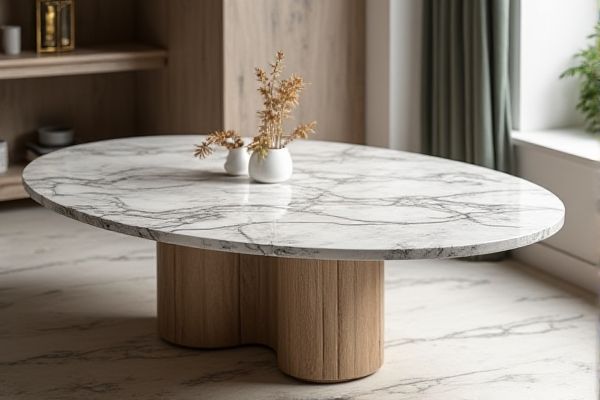
Marble top tables offer a timeless, natural elegance with unique veining but require regular sealing to prevent stains and scratches, whereas quartz top tables provide superior durability, low maintenance, and a uniform appearance ideal for heavy use. Discover which tabletop material best suits Your lifestyle and design preferences by reading the full comparison in the article below.
Table of Comparison
| Feature | Marble Top Table | Quartz Top Table |
|---|---|---|
| Material | Natural marble stone | Engineered quartz composite |
| Durability | Moderately durable, prone to scratches and stains | Highly durable, scratch and stain-resistant |
| Maintenance | Requires regular sealing and careful cleaning | Low maintenance, easy to clean |
| Appearance | Unique natural veining and patterns | Consistent patterns, available in various colors |
| Heat Resistance | Good heat resistance but can crack with extreme heat | Excellent heat resistant |
| Cost | Generally more expensive | Moderately priced |
| Weight | Heavy | Heavy but slightly lighter than marble |
| Environmental Impact | Natural stone extraction impact | Manufactured product, less natural resource usage |
Introduction to Marble and Quartz Top Tables
Marble top tables exhibit natural elegance with unique veining patterns formed from calcium carbonate, prized for their classic aesthetic and smooth, cool surface. Quartz top tables comprise engineered stone made from crushed quartz mixed with resin, offering superior durability, non-porous properties, and low maintenance compared to natural marble. Both materials serve as premium options for tabletops, with marble emphasizing timeless beauty and quartz emphasizing resilience and variety in design.
Material Composition and Aesthetics
Marble top tables feature natural calcium carbonate which creates unique veining and a luxurious, timeless aesthetic prized for elegance and sophistication. Quartz top tables consist of engineered stone made from crushed quartz combined with resin, offering a consistent pattern and a wide range of color options that resist staining and scratching. The choice between marble and quartz balances the natural beauty and vulnerability of marble against the durability and design versatility of quartz.
Durability and Longevity Comparison
Quartz top tables outperform marble in durability due to their engineered composition, providing superior resistance to scratches, stains, and heat. Marble, while aesthetically timeless, is more porous and prone to etching and wear over time, which may affect its longevity in high-traffic areas. Choosing a quartz top ensures your table maintains its pristine appearance and structural integrity for years, making it a practical investment for lasting use.
Maintenance and Cleaning Requirements
Marble top tables require regular sealing to prevent staining and are sensitive to acidic cleaners, making maintenance more demanding. Quartz top tables offer a non-porous surface that resists stains and scratches, allowing for easier cleaning with mild soap and water. Quartz's durability and low maintenance needs make it a practical choice for busy households compared to the more delicate care marble demands.
Cost Analysis: Marble vs Quartz
Marble top tables typically cost between $50 to $150 per square foot, reflecting natural stone's luxury appeal and unique veining patterns, whereas quartz tops range from $60 to $120 per square foot, offering a more affordable yet durable alternative. Marble requires periodic sealing and maintenance, increasing long-term costs, while quartz's non-porous surface minimizes upkeep expenses. Opting for quartz often results in better cost efficiency without compromising on aesthetic versatility or durability.
Heat and Scratch Resistance Differences
Quartz top tables offer superior heat and scratch resistance compared to marble tops, making them ideal for heavy-use environments. Marble tends to be softer and more porous, which results in easier scratching and susceptibility to heat damage such as discoloration or etching. Quartz tops incorporate engineered resin and natural minerals that create a durable, non-porous surface resistant to both high temperatures and abrasion.
Stain and Chemical Resistance
Marble top tables, composed of natural calcium carbonate, are highly susceptible to staining and etching from acidic substances such as wine, coffee, and citrus due to their porous surface. Quartz top tables, engineered from natural quartz crystals bound with resin, exhibit superior stain and chemical resistance, making them ideal for high-use areas prone to spills and corrosive materials. The non-porous nature of quartz surfaces ensures ease of maintenance and durability against harsh chemicals in comparison to the more delicate marble.
Customization and Design Options
Marble top tables offer unique, natural patterns and color variations that create one-of-a-kind surfaces, ideal for bespoke luxury designs. Quartz top tables provide extensive customization through engineered compositions, allowing precise control over color, texture, and finish for consistent and modern aesthetics. Both materials support tailored designs, but quartz excels in versatility with enhanced options for edge profiles and integrated patterns.
Environmental Impact and Sustainability
Marble top tables involve natural stone extraction, which can result in significant environmental disruption and carbon emissions from quarrying and transportation processes. Quartz top tables are often engineered using a combination of natural quartz and resin, making them more resource-efficient with less quarrying needed and offering longer durability that reduces the need for replacement. Consideration of embodied energy and recyclability indicates quartz surfaces generally have a smaller environmental footprint and higher sustainability potential compared to traditional marble.
Which Table Top is Right for You?
Marble top tables offer natural elegance and unique veining, ideal for those seeking timeless beauty and a luxury aesthetic, though they require regular sealing and can be prone to staining and scratching. Quartz top tables provide superior durability, non-porous surfaces, and low maintenance, perfect for busy households or commercial spaces requiring stain and heat resistance. Consider lifestyle needs, maintenance willingness, and aesthetic preferences to determine whether the organic charm of marble or the practical strength of quartz aligns best with your space.
 homyna.com
homyna.com